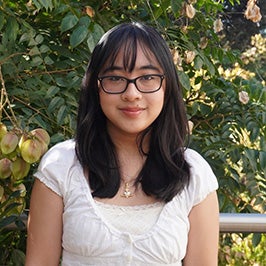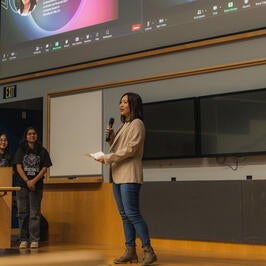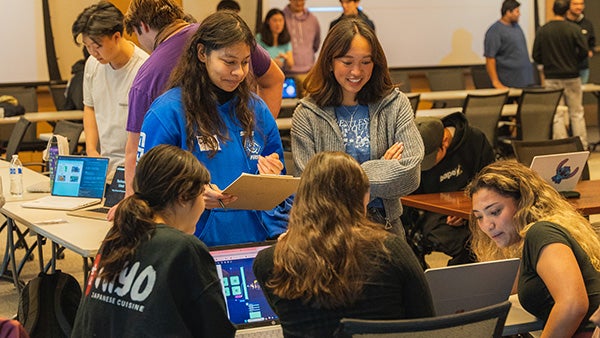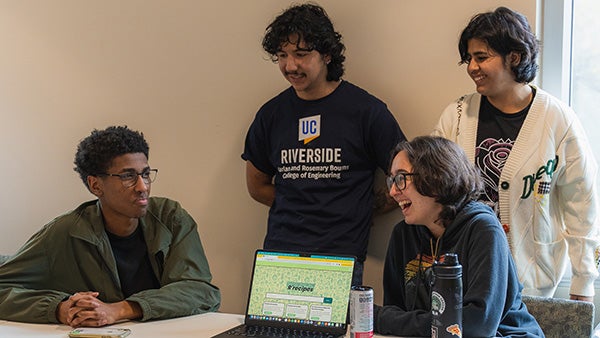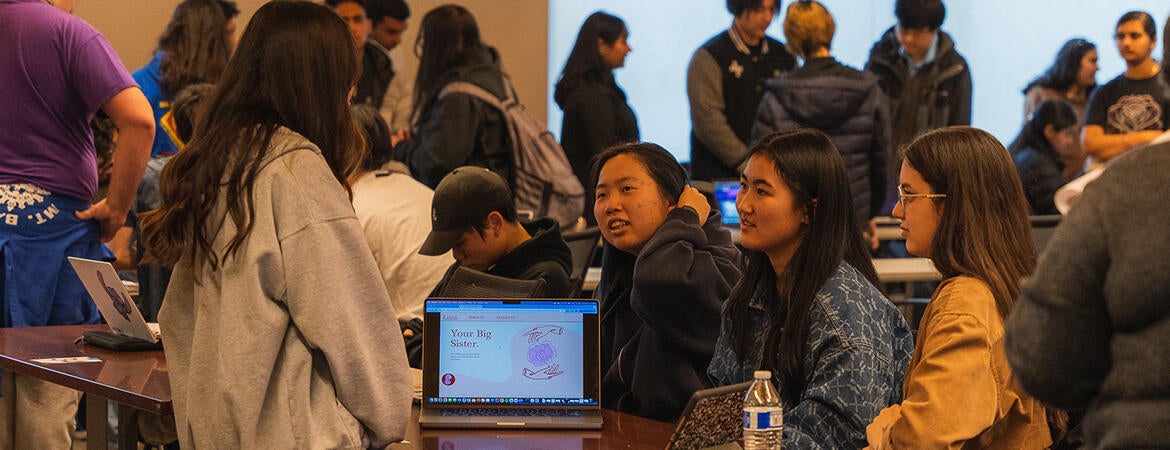
One team of students designed a web-based one-stop shop for women’s mental and physical health. Another team built a prototype for an affordable alternative to Apple’s facial recognition technology. And another developed an application that analyzes digital text for gender bias.
While each of these projects differed, the students who developed them had done so in the spirit of community that encourages individuals from diverse backgrounds to connect, to learn, and share their deep-rooted passion for science, technology, engineering, and technology (STEM).
In this regard, the recent seventh annual Rose Hack was a rousing success. Students from the Marlan and Rosemary Bourns College of Engineering (BCOE) as well as other UC Riverside schools and colleges and local high schools were among those who participated in a two-day event marked by competitions, workshops, mentorship, and an inspiring keynote speaker.
“Through this hackathon, our goal is to create a safe environment for minorities in technology to create innovative projects, network, and learn new skills, all in their shared passion in STEM,” said Angelika Bermudez, Rose Hack’s director and a computer science major.
Billed as the first women-centric hackathon in the Riverside and San Bernardino counties region, it was launched to encourage women and others from underrepresented groups who are interested in STEM to gain experience and pursue innovation and discovery via a project competition.
The name “Rose Hack” is a reference to BCOE co-founder Rosemary Bourns, also a co-founder — along with her spouse Marlon — of electronics manufacturer and industry leader Bourns, Inc., headquartered in Riverside. Rose Hack was founded by the Society of Women Engineers (SWE) and Women in Computing (WinC) (formerly the Association for Computing Machinery – Women) in 2018.
This year’s event was held on January 20-21, with the first 24 hours devoted to projects, and the remaining time set aside for judging and for students to participate in workshops, Bermudez said. Rose Hack — which is free to all students — drew nearly 250 participants, with the majority of those who attended being BCOE and UC Riverside students and others from local high schools and colleges.
Every year, Rose Hack organizers select a keynote speaker who will inspire and provide advice to students. They seek speakers who can explore the topics of inequality in the tech workplace, dealing with adversity, “imposter syndrome,” and developing leadership skills.
This year’s keynote speaker was BCOE alum Annie Du (BS, Computer Engineering, ’19). At the time, Du served as a cloud security engineer for BlackLine, a women-led financial and accounting software firm, but she recently took on a new position as a security engineer for Netflix.
Du said she looked at her speaker role as an opportunity to “share a unique perspective that could hopefully help alleviate some fears that women engineers may have.”
“I agreed to speak at Rose Hack because I was once an aspiring women engineer with fears of being a woman in the industry,” she said. “I was also brought up and nurtured by a women-led company [who] I am currently a part of and achieved consideration only with the support of women in tech before me.“
While some progress has been made, women and others remain underrepresented in engineering and other STEM fields. In 2021, women made up 35 percent of STEM occupations and only 28 percent specifically in science and engineering jobs, according to a 2023 report by the National Science Foundation and National Center for Science and Engineering Statistics. Hispanic, Black, and individuals from indigenous backgrounds made up 24 percent of the STEM workforce in 2021.
Du said Rose Hack filled her with “a sense of belonging.”
“I think the future generation of women engineers will really appreciate this event and be able to fully utilize this support group to build confidence,” she said.
This year’s Rose Hack included a series of student-led workshops covering programming languages, software libraries, and developer platform GitHub. In all, there were six award categories and tracks including the Women Centric Track for projects that “empower, celebrate, and/or support women in some shape or form.”
Students were able to use Discord — a popular instant-messaging and voice communication platform — to keep in contact with multiple mentors made available to participants, Bermudez said.
"Participants would be able to call mentors and have them directly work with students to solve issues," she said. "This allowed us to always have at least three to five people available to help if anyone requested, allowing project development to move at a quick pace."
One of the winners of the Best Diversity, Equity, and Inclusion (DEI) Hack focused on women’s health and disinformation. Luna — tagged as “Your Big Sister” — compiles information on mental, reproductive, menstrual, and sexual health in one place along with links to resources. The project team was made up of Mckenna Bridgewater, Osanna Deng, and Rachel Chan.
Gals Press was designed to help users analyze digital text. A user pastes text into a field, then the app analyzes the text and displays any detected bias and provides a sentiment analysis. The project team consisted of Dennis Santoso, Aaron Tam, Jonathan Trujillo, and Raidah Fairooz.
Blockchain-Based Biometric Identity Verification earned the Best Use of Flow award, and it was designed as cost-effective, open-source alternative to Face ID, Apple’s facial recognition system used to access its iPhone and iPad products. The team consisted of Justin Im, Alex Hernandez, Emily Clark, and Kavin Phabiani.
“We hope that all students who participate in Rose Hack learn about the impact they have in the tech world by being a part of our women-centric event and, of course, experience an enjoyable time surrounded by people who share the same beliefs in gender equality,” Bermudez said.
Header image: Student participants attending 2024 Rose Hack (Photo courtesy of Rose Hack).
